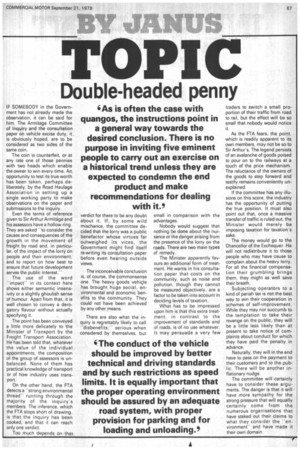TO 1E 1 C
Page 69

If you've noticed an error in this article please click here to report it so we can fix it.
Double-headed penny
EF SOMEBODY in the Government has not already made the observation, it can be said for him. The Armitage Committee of Inquiry and the consultation paper on vehicle excise duty, it is obviously hoped, are to be considered as two sides of the same coin.
The coin is counterfeit, or at any rate one of those pennies with two heads which enable the owner to win every time, An opportunity to test its true worth has been taken, perhaps deliberately, by the Road Haulage Association in setting up a single working party to make observations on the paper and submissions to the inquiry.
Even the terms of reference given to Sir Arthur Armitage and his assessors have a hollow ring. They are asked "to consider the causes and consequences of the growth in the movement of freight by road and, in particular, of the impact of the lorry on people and their environment; and to report on how best to ensure that future development serves the public interest."
The use of the word 'impactin its context here shows either semantic insensivity or a slightly ghoulish sense of humour. Apart from that, it is well chosen to convey a derogatory flavour without actually specifying it.
The point has been conveyed a little more delicately to the Minister of Transport by the Freight Transport Association. He has been told that, whatever the value of the individual appointments, the composition of the group of assessors is unbalanced. None of them has practical knowledge of transport or of how industry uses transport.
On the other hand, the FTA detects a "strong environmental threadrunning through the majority of the inquiry's members. The inference, which the FTA stops short of drawing, is that the inquiry has been cooked, and that it can reach only one verdict.
Too much depends on-that.
• verdict for there to be any doubt about it. If, by some wild mischance, the committee decided that the lorry was a public benefactor whose virtues far outweighed its vices, the Government miOht find itself re-writing its consiultation paper before even hearing outside views.
The inconceiva le conclusion is, of course, the ommonsense one. The heavy oods vehicle has brought huge social, environmental and economic benefits to the community. They could not have been achieved by any other means.
There are also what the inquiry is regrettably likely to call -disbenefits," serious when considered by themselves, but
small in comparison with the advantages, Nobody would suggest that nothing be done about the nuisance or the danger arising from the presence of the lorry on the roads. There are two main types of remedy.
The Minister apparently favours an additional form of treatment. He warns in his consultation paper that costs on the community, such as noise and pollution, though they cannot be measured objectively, are a factor to be taken into account in deciding levels of taxation.
What has to be impressed upon him is that this extra treatment, in contrast to the rnprovernent of standards and of roads, is of no use whatever, It may persuade a very few traders to switch a small proportion of their traffic from road to rail, but the effect will be so small that nobody would notice
it.
As the FTA fears, the point, which is readily apparent to its own members, may not be so to . Sir Arthur's. The legend persists of an avalanche of goods poised to pour on to the railways at a touch of the price mechanism. The reluctance of the owners of the goods to step forward and testify remains conveniently unexplained.
If the committee has any illusions on this score, the industry has the opportunity of putting the true position. It must also point out that, once a massive transfer of traffic is ruled out, the Minister would merely be imposing taxation for taxation's sake.
The money would go to the Chancellor of the Exchequer. He will not redistribute it to those people who may have cause to complain about the heavy lorry. For all the financial compensation their grumbling brings them, they might as well save their breath.
Subjecting operators to a kind of pariah tax is not the best way to win their cooperation in schemes of self-improvement. While they may not succumb to the temptation to take their revenge on the public, they will be a little less likely than at present to take notice of complaints about conduct for which they have paid the penalty in advance.
Naturally, they will in the end have to pass on the payment to their customers and to the public. There will be another inflationary nudge.
The committee will certainly have to consider these arguments. The danger is that it will have more sympathy for the. strong pressure that will equally certainly come from the numerous organisations that have staked out their claims to what they consider the "environment" and have made it their own domain.












































































































































